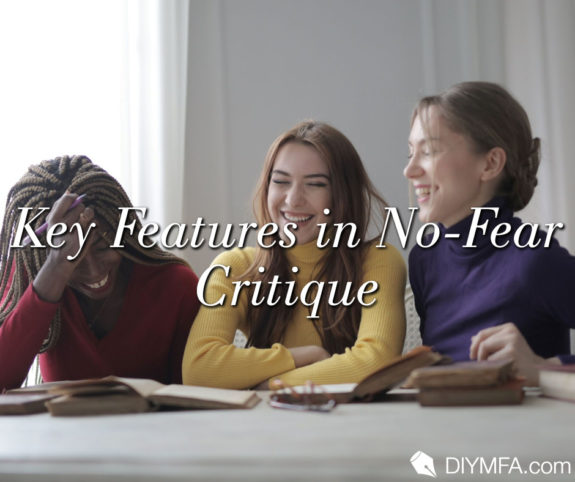It is fascinating how past experiences culminate into the present, creating beliefs. Taking part in critique was, at times, akin to a battlefield. The gauntlet was daunting and sometimes painful. In academia, I developed shied away from peer critique and moved toward mentors and professionals for feedback after much proactive work on my part.
As an instructor, the value of peer critique over the potential negative experience was not there, so I developed a form of passive critique. My goal was for students to grow in their writing without the uncomfortable feedback that wasn’t necessarily productive.
DIY MFA 101’s Critique Sessions
With inner awareness, I am open to another point of view and perhaps a paradigm shift. Enter DIY MFA 101’s critique sessions. My goal for the course was revising and editing my work for publication. As the critique sessions became available, I didn’t dive into the opportunity. Instead, I steeled myself for the recordings to observe a known dynamic of discomfort, a not necessarily expansive exercise.
After the first critique session, I reconsidered my perspective. With Gabriela’s approach, the clear parameters considered peers as actual beings when receiving feedback. I believe most creatives are quite connected to their work, so critique is a personal experience. The session’s vibe surprised me. Writers are placed in the spotlight via their work, and they themselves are seen.
I found the response was a blend of success along with challenge areas. The brain is wired for negativity as a survival response, and that can be contagious. It was interesting to see that those providing critique didn’t seem to feel the impetus to say just anything, as thoughtful response was encouraged. At this point, I relaxed a bit more into the process, still observing the session more than listening to the content.
Critique sessions with Gabriela are multifaceted. I noticed something extra was surfacing. A reader’s response. Writers are getting to know who their readers are. It is rare to receive such feedback from actual readers: why the reader is captivated with your work and what personally resonated with them. The response came from both actual genre readers as well as those that relate to the story in some way. For a peer review, I found this very intriguing. I think of it as a beta-reader preview.
Writers can learn from response to others’ work. Gabriela encourages writers to consider all feedback in regards to their own writing. This component was especially motivating, for there is a fine balance between supporting the writer while considering your own learning. This is healthy interdependence at its best.
As a former English and art instructor, I believe one goal is to learn to discern feedback, encouraging ownership of one’s writing. Growth being the target, the work being something that you’d like to get out in the world. Creating a trusting environment is the foundation for the experience. Gabriela creates an atmosphere by placing writers in a safe space and drawing in response when it strays. At this point, I found myself looking forward to each individual’s critique, leaning into certain writers’ manner of cogent response. Interestingly, in this space, your potential future critique group begins to form.
In a trusting environment, one can discern what is valuable feedback, what is not to be considered as heavily, and what to discard. Remarkably, I found that neutral and irrelevant feedback is useful. A writer can consider the source and get to know the response. Knowing who your work is not for and what your work is not, along with whom it is for and what it is, has value. As every response has an aspect of significance, your writing and discernment improves as you hone your critique-receiving chops. Gabriela’s critique sessions create space for practice and growth.
To develop the ability to receive feedback is key for writers and artists alike. Gabriela’s 101 course provides an excellent place to start. As your work gets out there, feedback will come in many forms. There will not always be a gatekeeper, a Gabriela, to filter content and provide expertise. Discernment assists in refining feedback response. It provides structure that allows the writer to take in information and mine for growth without being overwhelmed by judging the experience and individuals providing critique.
Gabriela’s space is safe and respectful. The participants are provided guidelines for response and the writers are provided parameters for asking questions, not responding to critique. I noticed that there is a form of allowing that takes place on both sides. When you take the approach that everyone’s doing their best in that moment, the space remains clean.
Gabriela is the last to speak. Though I found that individuals still tend to gather in lines of thought, leaving her pure gold to the last allows the peer group to chew on and suss out areas they may not have explored. Her response carries prime content for improving your work. Whenever Gabriela speaks, my fingers are on the keys taking notes, highlighting, underlining, and bolding as her writing expertise is shared with the group.
Finally Relaxing
As the sessions continued, I began to relax into the process. Before these meetings, I would have never considered a peer group for review of my work. I believe it is important to find your cohort where you are of comparable mindset, with a window of common acumen and on the same path regarding goasl. The individuals need to be all-in, prepared to bring their A-game. It’s not necessary that everyone has the same level of knowledge and expertise in writing. It is important that parameters are mutually respected and the spirit of allowing as well as integrity is maintained.
As we are the culmination of our experiences on this planet, being open to the what-if is key to peer critique. After Gabriela’s sessions, I see the process in a whole new light. Dynamic transformed, paradigm shifted. When there is trust, compassion and an understanding of what the other is experiencing, a valuable response for growth occurs. Our ultimate goal is to share our work with our readers, peer critique can be an integral part of the journey.
In that, I’ve met others with similar views on peer critique.
Consider this: If peer critique is not your comfort zone, lean into the possibility. It’s the little things that culminate into progress. A writer can begin by observing. Then be prepared to thoughtfully respond, using your writing skills and readership hat. When you are ready, submit your work for feedback. Discern and ask questions. Gabriela creates a dynamic safe space for such an undertaking. It’s a great place to start your peer review adventures in critique.

Chere Hughes is an author and instructional designer who writes middle grade and adult fantasy fiction. From a perspective of within, Chere expresses motivations of the human spirit. Her colorful writing spins tales integrating current culture within fantasy realms. As a former English and art instructor at Vincennes University, Chere has designed numerous courses. She blogs on her website at Cherehughes.com You can find her on Instagram, Facebook and Twitter Chere lives and writes in Flagstaff, AZ.







